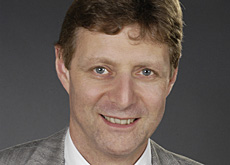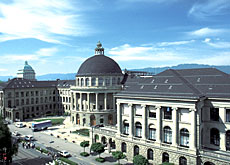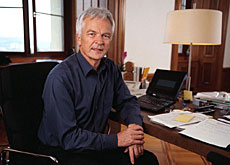Federal institute aims to lead the way

Professor Ernst Hafen, who took over as president of Zurich's Federal Institute of Technology on December 1, shares his vision with swissinfo.
Hafen wants the federal institute to lead the way in education in Switzerland by changing its system of teaching and forging closer links with industry.
He believes student fees would help students make better decisions and help fund education at the institute in future.
And he thinks a referendum vote at the end of last year to impose a moratorium on genetically modified crops in Switzerland was a mistake.
swissinfo: What are your main goals as head of Zurich’s Federal Institute of Technology?
Ernst Hafen: I have formulated five different aims:
Teaching: This is a very important part of our obligations. I want to put not only the best researchers, but also the best teachers on a pedestal. Knowledge is now available everywhere thanks to the internet. Therefore we have to change the way we teach away from just delivering knowledge and testing students.
Promotion of young talent: This should start before students even get to university. We can assess students before they enrol and during their studies to give them feedback and career advice to help them make better decisions.
Diversifying financing: Teaching and research are global so we have to keep up with the likes of China, Singapore and the United States. We can only do that if financing keeps up too. We cannot expect financing from the state to increase much so we have to look at ways of increasing third party income from grants, fund raising and industry.
Technology transfer: We want to promote the entrepreneurial spirit so that students realise that they should take their achievements away and start a company. At the same time we want to develop competence centres that work on topics that are attractive to industry.
Communication: What the federal institute did so well in [2005] its 150th anniversary year was to communicate to the public. This is something that is going to be more important in years to come.
swissinfo: What are the biggest challenges facing you?
E.H.: To continue to recruit the best minds as professors and as students at both undergraduate and graduate level.
swissinfo: Will students have to pay more towards their own education in future?
E.H.: It is clear to me that if you want to improve education then it comes at a price. Student fees are something we should discuss very clearly.
We have to tell students that this does not prevent anyone from studying, but what it may do is make students think more carefully about what they want to study. At the moment 30 per cent of students drop out after their first year.
A bit more early decision-making will not hurt. They would not be so quick to switch subjects if they knew it would cost them or their parents money.
swissinfo: Do you pay much attention to league tables of universities?
E.H.: Students will choose more and more where they study… We will have these ratings whether they are good or bad or whether they are just or not. It is a reflection of a more transparent and global education market.
swissinfo: Is the recent moratorium on genetically modified crops in Switzerland a threat to the federal institute?
E.H.: We already have a number of internationally recognised professors in this field here at the federal institute. But if this vote had taken place five years ago it would have killed our recruitment process.
In the 1960s everyone was against concrete and that damaged the recruitment of civil engineers. In the 1980s nuclear power plants were under attack and no one wanted to go into nuclear physics any more.
This also highlights the importance of communication. If we could go back to the beginning with GM plants then we would want to do it in a different way. If we started with GM oranges that tasted better or kept longer then I’m sure the negative reaction would not be as strong as it is now.
For the moment consumers do not see the benefits of GM crops.
swissinfo: How would you want the federal institute to be known after you have finished your tenure?
E.H.: During Vision Week [part of the 150th anniversary celebrations] the public accepted it as a leading institution and the public is waiting for it to lead the way. This is a fantastic challenge and I am really looking forward to it.
I am excited about becoming the head of the Federal Institute of Technology in Zurich because we have so much strength already in place. We have strong life sciences together with physics, chemistry, architecture, engineering, biotechnology, information sciences and nanotechnology.
If we can get people working together then we have a fantastic chance of making the future.
swissinfo-interview: Matthew Allen in Zurich
Hafen studied molecular- and cell biology at the Biocenter in Basel before working at the University of California at Berkeley and then at Zurich University’s Institute of Zoology.
He received the prestigious Ernst Jung, Friedrich Miescher and Otto Naegeli awards for his study of growth control and metabolism in genes.
He was also a member of the National Research Council, professors’ representative at the Council of Zurich University and on the editorial boards of several major journals.

In compliance with the JTI standards
More: SWI swissinfo.ch certified by the Journalism Trust Initiative




You can find an overview of ongoing debates with our journalists here. Please join us!
If you want to start a conversation about a topic raised in this article or want to report factual errors, email us at english@swissinfo.ch.